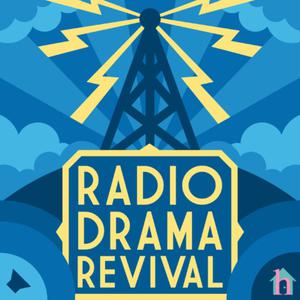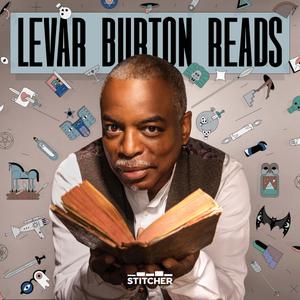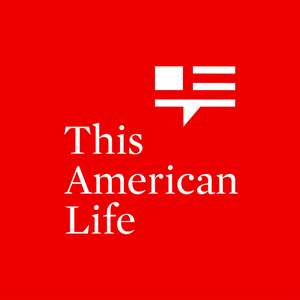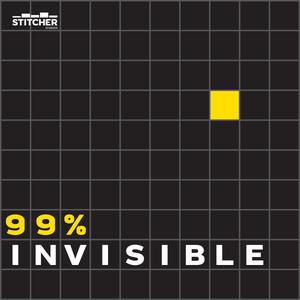
Radio Drama Revival
Hug House Productions
Radio Drama Revival is dedicated to showcasing the diversity and vitality of modern audio fiction.
- 1 hour 3 minutesHi Nay - Motzie Dapul
Horror is more than just the white final girl riding off in the sunset covered in blood; it’s a genre booming with marginalized, oppressed, and colonized writers as a space to directly confront the violences they have suffered. We talk all that and more, with Motzie Dapul, right here on Radio Drama Revival.
Like what you hear? Us too. You can support Hi Nay at https://www.patreon.com/hinaypod.
Learn more about how to support Radio Drama Revival on our website.
This episode of Radio Drama Revival was recorded in the unceded territory of the Kalapuya people, the Clatskanie Indian Tribe, the Cowlitz Indian Tribe, and the Atfalati tribe. Colonizers named this place Beaverton, Oregon.
16 February 2023, 3:40 am - 40 minutes 38 secondsHi Nay - 'Bulok'
When the monsters you faced in your homeland come out of the shadows in the new city you’re living peacefully in, what can you do but face them head on? Come and meet Mari, a Filipina from a babaylan family living in Toronto, right here on Radio Drama Revival.
Like what you hear? Us too. You can support Hi Nay at https://www.patreon.com/hinaypod.
Learn more about how to support Radio Drama Revival on our website.
This episode of Radio Drama Revival was recorded in the unceded territory of the Kalapuya people, the Clatskanie Indian Tribe, the Cowlitz Indian Tribe, and the Atfalati tribe. Colonizers named this place Beaverton, Oregon.
4 January 2023, 1:00 pm - 54 minutes 28 secondsThis Planet Needs a Name - Evan Tess Murray & Trace Callahan
Hope is not the lonely candle in the dark. Hope is the light of the candle in the dark, and you have to light the candle yourself. Hope needs sustenance, hope needs energy put into it in order for it to survive. We’re talking to Evan Tess Murray and Trace Callahan about hope in This Planet Needs a Name, right here on Radio Drama Revival.
Like what you hear? Us too. You can support the crew of This Planet Needs a Name at needsanamepod.com/support-us.
Learn more about how to support Radio Drama Revival on our website.
This episode of Radio Drama Revival was recorded in the unceded territory of the Kalapuya people, the Clatskanie Indian Tribe, the Cowlitz Indian Tribe, and the Atfalati tribe. Colonizers named this place Beaverton, Oregon.
21 December 2022, 1:00 pm - 42 minutes 7 secondsThis Planet Needs a Name - 'Prologue: The Nameless Crew'
Do you believe, in your heart of hearts, that somewhere else far away there is a planet where we could sustain human life? And do you believe we could start something new there, something different from what we are experiencing now? Imagine a hopeful future with This Planet Needs a Name, right here on Radio Drama Revival.
Like what you hear? Us too. You can support this crew on needsanamepod.com/support-us.
Learn more about how to support Radio Drama Revival on our website.
This episode of Radio Drama Revival was recorded in the unceded territory of the Kalapuya people, the Clatskanie Indian Tribe, the Cowlitz Indian Tribe, and the Atfalati tribe. Colonizers named this place Beaverton, Oregon.
7 December 2022, 1:00 pm - 48 minutes 33 secondsPrimordial Deep - Jordan Cobb
What is it about lyrical, beautiful descriptions about the horrifying that makes you both lose your breath and lose your sleep? We discuss the ocean, fear, horror, and how we need families to manage it all, with Jordan Cobb, creator of Primordial Deep.
Like what you hear? Us too. You can support the creators of Primordial Deep at nosuchthingradio.com/support.
Learn more about how to support Radio Drama Revival on our website.
This episode of Radio Drama Revival was recorded in the unceded territory of the Kalapuya people, the Clatskanie Indian Tribe, the Cowlitz Indian Tribe, and the Atfalati tribe. Colonizers named this place Beaverton, Oregon.
28 September 2022, 1:00 pm - 48 minutes 25 secondsPrimordial Deep - 'Tiamat'
What creatures live down in the deep? What horrors will tread through your nightmares of water and darkness? Discover the bottom of the ocean in Primordial Deep, right here on Radio Drama Revival
Like what you hear? Us too. You can support the creators of Primordial Deep at nosuchthingradio.com/support.
Learn more about how to support Radio Drama Revival on our website.
This episode of Radio Drama Revival was recorded in the unceded territory of the Kalapuya people, the Clatskanie Indian Tribe, the Cowlitz Indian Tribe, and the Atfalati tribe. Colonizers named this place Beaverton, Oregon.
21 September 2022, 1:00 pm - 55 minutes 52 secondsZero Hours - Sarah Shachat & Zach Valenti
It’s interesting how we always return to the apocalypse, both as a concept of our inevitable future, and as an event that has already occurred. We’re obsessed with death, and endings. Let’s find out what’s involved in the apocalypses of Zero Hours.
Like what you hear? Us too. You can support Long Story Short Productions and Zero Hours at ZeroHoursPodcast.com.
Learn more about how to support Radio Drama Revival on our website.
This episode of Radio Drama Revival was recorded in the unceded territory of the Kalapuya people, the Clatskanie Indian Tribe, the Cowlitz Indian Tribe, and the Atfalati tribe. Colonizers named this place Beaverton, Oregon.
14 September 2022, 12:00 pm - 40 minutes 47 secondsZero Hours - 'These Familiar Spirits'
It’s the end of the world as we know it — or maybe not. You can only find out by counting down with Zero Hours.
Like what you hear? Us too. You can support Long Story Short Productions and Zero Hours at ZeroHoursPodcast.com.
Learn more about how to support Radio Drama Revival on our website.
This episode of Radio Drama Revival was recorded in the unceded territory of the Kalapuya people, the Clatskanie Indian Tribe, the Cowlitz Indian Tribe, and the Atfalati tribe. Colonizers named this place Beaverton, Oregon.
7 September 2022, 12:00 pm - 51 minutes 9 secondsMeteor City - Madelyn Dorta
Sometimes, when you visit a place, it is electrifying. It’s a place that digs deep into your soul, into your bones, until it shows up in your art. Join us as we talk with Madelyn Dorta about Meteor City, and its inspiration in the city of Detroit, right here on Radio Drama Revival.
Content Warning: Discussions of the effects of gentrification on communities of color, racism in entertainment, and the reality of Detroit after the 2008 economic crisis.
Like what you hear? Us too. You can support Wrightwood Studios on their website.
Learn more about how to support Radio Drama Revival on our website.
This episode of Radio Drama Revival was recorded in the unceded territory of the Kalapuya people, the Clatskanie Indian Tribe, the Cowlitz Indian Tribe, and the Atfalati tribe. Colonizers named this place Beaverton, Oregon.
If you are looking for ways to support or donate to Native communities, the Quileute are fundraising to move their at-risk community to higher ground, and out of the tsunami zone, so that their culture and heritage can thrive for generations to come. Their first objective is to move the Quileute Tribal School, which is currently located right next to the beach, endangering the lives of children and the future of the Quileute tribe. You can learn more and donate at https://mthg.org.
22 December 2021, 5:00 pm - 42 minutes 55 secondsMeteor City - 'Patty Melt'
Recovery from disaster is long, arduous, and complex, especially when corporations move in to take over your home, transforming it into something you don’t recognize. Join Bianca as she returns to Meteor City, right here on Radio Drama Revival.
Content Warnings: A community post-natural disaster.
Like what you hear? Us too. You can support Wrightwood Studios on their website.
Learn more about how to support Radio Drama Revival on our website.
This episode of Radio Drama Revival was recorded in the unceded territory of the Kalapuya people, the Clatskanie Indian Tribe, the Cowlitz Indian Tribe, and the Atfalati tribe. Colonizers named this place Beaverton, Oregon.
If you are looking for ways to support or donate to Native communities, the Quileute are fundraising to move their at-risk community to higher ground, and out of the tsunami zone, so that their culture and heritage can thrive for generations to come. Their first objective is to move the Quileute Tribal School, which is currently located right next to the beach, endangering the lives of children and the future of the Quileute tribe. You can learn more and donate at https://mthg.org.
8 December 2021, 5:00 pm - 57 minutes 1 secondDos: After You - David Orión Pena
The gray reality of Deck is a vehicle for discussing love, loss, and identity for writer David Orión Pena, creator of Dos: After You. Join us for our interview right here on Radio Drama Revival.
Like what you hear? Us too. You can support David Orión Pena and Dos: After You on Ko-fi at https://ko-fi.com/dosafteryou.
Learn more about how to support Radio Drama Revival on our website.
This episode of Radio Drama Revival was recorded in the unceded territory of the Kalapuya people, the Clatskanie Indian Tribe, the Cowlitz Indian Tribe, and the Atfalati tribe. Colonizers named this place Beaverton, Oregon.
If you are looking for ways to support or donate to Native communities, the Quileute are fundraising to move their at-risk community to higher ground, and out of the tsunami zone, so that their culture and heritage can thrive for generations to come. Their first objective is to move the Quileute Tribal School, which is currently located right next to the beach, endangering the lives of children and the future of the Quileute tribe. You can learn more and donate at https://mthg.org/.
17 November 2021, 5:00 pm - More Episodes? Get the App
Your feedback is valuable to us. Should you encounter any bugs, glitches, lack of functionality or other problems, please email us on [email protected] or join Moon.FM Telegram Group where you can talk directly to the dev team who are happy to answer any queries.
 The Daily
The Daily
 Wait Wait... Don't Tell Me!
Wait Wait... Don't Tell Me!
 LeVar Burton Reads
LeVar Burton Reads
 This American Life
This American Life
 The Moth
The Moth
 99% Invisible
99% Invisible